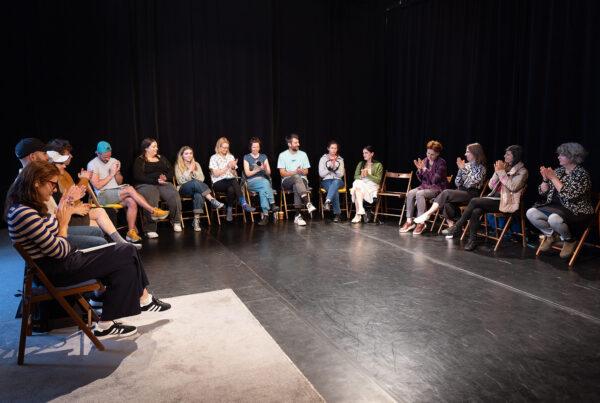Reflections from Schoolyard Stories Project- Theatre for adolescents (1)
By María Inés Falconi
The Schoolyard Stories Project- Theatre for Adolescents 2nd edition, was launched in 2015 organized by ATINA (ASSITEJ Argentina) with the participation of the ASSITEJ Centers of the TYA Ibero American Network.
The aim of the proposal is to encourage theatre for adolescents development in our region composed by Spanish and Portuguese speaking countries. Schoolyard Stories is a project to be developed along three years in three different steps: playwriting contest, directors workshops and theatre for adolescents festival.
The topic for this edition was Adolescent Identity,. The authors, after a field research with adolescents groups wrote their plays, which talk about identity from different points of view: sexual or ethnic identity, social confrontations, personality development, discrimination, migration, violence, etc. Seven plays have been selected and 14 directors from different regions are now working to stage them in their theatres.
Along the exchange held by directors, authors and coordinators, inquiring about why and for what they decided to participate in the project, some recurrent topics arise which allow us to think about the situation of theatre for youngsters in our region, and specially to point what theatre for adolescents in Latin America lacks.
First, theatre “for” adolescents is frequently mixed up with theatre “with” adolescents, perhaps because the ones who are interested in this age range are teachers, who work with adolescents in their drama workshops. The tradition of theatre played by professionals devoted to adolescent audiences is not so frequent in Ibero America. High schools are not used to attending the theatre and, in case they do, it is usually to see plays based on “curricular” topics, mostly classics. At the same time, the youngsters aren’t used to go to the theatre by themselves. In both situations we should say that this is not only lack of interest but also lack of appropriate proposals.
Because of the lack of experience and also because of the lack of audiences that could stimulate their work, professionals choose to create theatre for small children or theatre for adults better than theatre for adolescents. Even if they wished to do it, they wouldn´t know how to. That´s to say: there aren’t any schools where to learn it, no tradition, no spaces where to achieve experience and the contacts and exchange with professionals from other regions are more than limited, specially because of financial difficulties. Frequently, the programs of theatre for adolescents select theatre for adult plays, as they do not find anything better for this audience.
The main complaint from practitioners is regarding texts. They complain because they cannot find play texts devoted to adolescents. This pushes them to create their own proposals raised from improvisations presented by the adolescents themselves. These texts have no continuity in time, are not spread, are not worked by other groups and sometimes are not even written. Frequently they are only used for a particular presentation of that group once or twice. When the texts do not move around it´s not possible to make them evolve and acquire experience because each practitioner is always experiencing it for the first time.
Another interesting issue they pose as a complaint is the lack of exchange proposals. The directors who participated in the workshop are pleased to find colleagues here, with whom they can share their proposals and doubts. The question is: shouldn´t we work harder to organize encounters for professionals with the aim of training, exchanging and/or learning? We could say that in Ibero America this is almost a new theatre genre, so we need time to research about it together.
Finally we have to point out the difficulties we face when we go deeper in theatre for adolescents nowadays, in the XXI Century, with communication systems that change minute after minute, with changing codes, with moving societies, youngsters in the limits, and an unknown future. The question of what and how, fly over each one of our proposals.
Frequently, when society does not understand, they ignore, marginalize, despise, look down on the adolescent. We run the risk that the Ibero American theatre is the same way. The duty is huge and we are sure we cannot run it alone. Projects as Schoolyard Stories help us think and walk together to face this defeat. Similar projects should reproduce along Ibero America so time does not win the game.
María Inés Falconi
Secretary of ATINA
Honorary Member of ASSITEJ
(1) Adolecer means to lack or to suffer and in Spanish you can play with the verb “adolecer” with the noun “adolescente” (adolescent)



